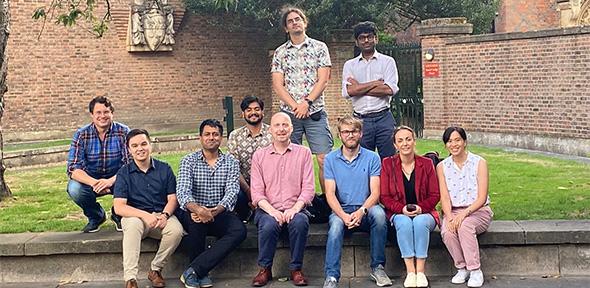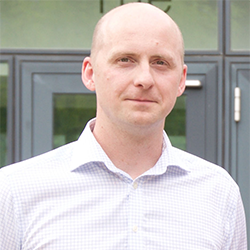
Submitted by Catherine Atkins on Wed, 24/05/2023 - 13:05
It is with great sadness that we announce the death of Charles Massie on May 5th 2023, at the age of 45 after a long battle with cancer. Charlie passed away peacefully following a short stay in the Arthur Rank Hospice.
Charles was born to Kenneth and Janis Massie in Dumbarton, to the west of Glasgow, with two older sisters, Ruth and Sarah. During his primary school years Charlie developed an interest in swimming, joining the Bearsden and Milngavie Club where he progressed to represent Scotland Under 16s in competitions in England, Sweden and America.
Charlie gained a scholarship to attend a prestigious local independent school, Keil, where he developed a passion for rugby, becoming rugby captain, and was also nominated head boy. He took an active interest in the mentoring of younger students, whom he felt were not being treated fairly, culminating in his receiving an award for citizenship in his final year.
In 1998, Charlie studied Biochemistry at Heriot-Watt University in Edinburgh. He graduated with a first-class Honours degree and the Watt Club medal for exceptional distinction, the highest achievement possible for undergraduates.
In 2001 Charlie made the move down south to Cambridge and completed a PhD in the Cancer Genomics Programme at the newly established MRC Cancer Cell Unit within the Hutchison building. His PhD, gained in 2005, was supervised by Dr James Brenton and entitled: The functional and transcriptional consequences of attenuating MBD2 in cancer cells, a subject he would return to throughout his career.
It was during his PhD years, in the ‘Hutch’, that Charlie met his wife Jess Pole and they were married in 2005. In the early years of their marriage, whilst living in Linton, Jess suggested Charlie should join the volunteer fire brigade – which Charlie did for several years until it became incompatible with a young family and work commitments.
Following his PhD he undertook postdoctoral research in respected laboratories across the Cambridge Biomedical Campus – David Neal, Tony Green, Nitzan Rosenfeld, Simon Tavare – further expanding his expertise into transcription factor regulation, cancer genomics, bioinformatics, epigenetics, circulating cell-free DNA.
In 2017, Charlie was awarded a prestigious CRUK Career Development Fellowship, and became an inaugural group leader within the Cambridge Early Detection Programme, returning to the Hutchison building, now the Early Cancer Institute, where his Cambridge career had begun.
Charlie’s research was dedicated to detecting cancers earlier, helping to better profile circulating tumour DNA in the blood, with particular focus on prostate cancer. Charlie led a group directly supervising three postdoctoral researchers, three research assistants, three PhD and a Masters student. This was in addition to a cumulative total of hundreds of students, researchers and academic clinicians he has assisted throughout his career. He was a central member of the CRUK International Cancer Genome Consortium and Pan Prostate Cancer Group. Charlie co-authored over a hundred papers, which have been cited by the scientific community over 12,000 times.
In his short life, Charlie has made a profound impact on numerous lives, leaving an indelible mark on those who were fortunate to know him. Those people would describe him as kind, gentle, marvellous, the very best, tolerant, patient, humorous, humble, generous, wise and inspirational. His unwavering dedication to his research and his pioneering work in the field of early cancer detection will continue to shape the lives of countless individuals for years to come.
Charlie's legacy extends far beyond his academic achievements. He will forever be remembered as a beloved husband to Jess, a cherished father to James (15) and Alice (13), and a treasured friend to many. Though we mourn his loss deeply, we are grateful for the time, however brief, that we shared in his company. Charlie’s memory will be cherished, and his absence will be forever felt.

